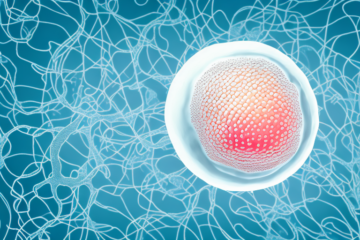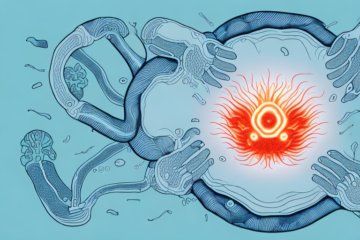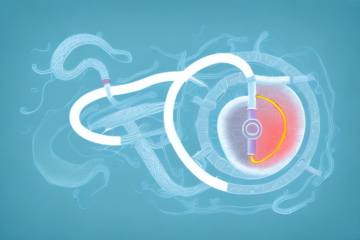Exocrine Pancreatic Insufficiency (EPI) is a medical condition that arises when the pancreas fails to produce adequate enzymes that are necessary for digestion. The deficiency of these enzymes can lead to difficulty breaking down nutrients in food, absorption of nutrients, and result in malnutrition. In this article, we will take an in-depth look at EPI and its various aspects.
What is Exocrine Pancreatic Insufficiency?
Before diving into the causes, symptoms, diagnosis, and treatment of EPI, let’s first understand what it means. As mentioned before, EPI is a disease that occurs when the pancreas fails to produce enough digestive enzymes for proper digestion. The pancreas produces enzymes such as lipase and amylase that help in breaking down fats and carbohydrates, respectively. Without sufficient pancreatic enzyme production, digestion becomes incomplete, leading to malabsorption and malnutrition.
It is important to note that EPI can be caused by a variety of factors, including chronic pancreatitis, cystic fibrosis, and pancreatic cancer. Additionally, certain medications and surgeries can also lead to EPI. Symptoms of EPI can include diarrhea, weight loss, and abdominal pain. Diagnosis typically involves a combination of medical history, physical examination, and laboratory tests. Treatment options may include pancreatic enzyme replacement therapy, dietary changes, and management of underlying conditions.
Causes of Exocrine Pancreatic Insufficiency
There are several causes of EPI, but the most common one is chronic pancreatitis. This condition is characterized by inflammation of the pancreas, leading to scarring and damage to the organ. Such damage can impair the pancreas’s ability to produce digestive enzymes, leading to EPI.
Other causes of EPI include cystic fibrosis, pancreatic cancer, and other pancreatic diseases that affect the functioning of the organ. Lifestyle factors such as heavy alcohol consumption also put a strain on the pancreas and can lead to EPI.
In addition to the aforementioned causes, certain medications can also lead to EPI. For example, long-term use of antibiotics can disrupt the balance of bacteria in the gut, which can affect the pancreas’s ability to produce enzymes. Similarly, chemotherapy drugs used to treat cancer can damage the pancreas and lead to EPI.
Another less common cause of EPI is a genetic disorder called Shwachman-Diamond syndrome. This condition affects multiple organs, including the pancreas, and can lead to a range of symptoms, including EPI.
Symptoms of Exocrine Pancreatic Insufficiency
One of the primary symptoms of EPI is abdominal pain, especially after meals. When the food is not entirely digested, it can lead to bloating, gas, and diarrhea. Patients with EPI experience weight loss and malnutrition due to their inability to absorb essential nutrients in food. A lack of digestive enzymes can also impair the absorption of fat-soluble vitamins such as A, D, E, and K. Thus, patients with EPI have a higher risk of developing nutritional deficiencies.
In addition to the symptoms mentioned above, patients with EPI may also experience frequent episodes of pancreatitis, which is inflammation of the pancreas. This can cause severe abdominal pain, nausea, and vomiting. Patients with EPI may also have oily or greasy stools due to the undigested fat in their diet.
It is essential to diagnose and treat EPI promptly to prevent further complications. Treatment options include pancreatic enzyme replacement therapy, which involves taking enzyme supplements with meals to aid digestion. Patients may also need to make dietary changes, such as reducing fat intake and increasing protein intake. In severe cases, surgery may be necessary to remove damaged parts of the pancreas.
Diagnosis of Exocrine Pancreatic Insufficiency
Diagnosis of EPI is essential as malnutrition and malabsorption of nutrients can pose significant health risks. Physicians typically use various tests, including fecal elastase test, fecal fat test, and blood tests, to diagnose EPI. These tests examine the level of pancreatic enzymes in the body and can also detect nutritional deficiencies. Imaging studies such as CT scans and MRIs may also be conducted to identify any underlying pancreatic diseases that may be causing EPI.
It is important to note that the symptoms of EPI can be similar to other digestive disorders, such as irritable bowel syndrome and inflammatory bowel disease. Therefore, it is crucial for physicians to conduct a thorough evaluation of the patient’s medical history and symptoms before making a diagnosis.
Once a diagnosis of EPI is confirmed, treatment typically involves enzyme replacement therapy, which involves taking pancreatic enzyme supplements with meals to aid in digestion. Patients may also need to make dietary changes, such as reducing fat intake and increasing protein and carbohydrate intake, to manage their symptoms and prevent malnutrition.
Treatment Options for Exocrine Pancreatic Insufficiency
EPI is a treatable condition, and the treatment aims to supplement the existing digestive enzyme levels in the body. The most commonly used treatment for EPI is Enzyme Replacement Therapy (ERT). ERT involves taking synthetic pancreatic enzymes in the form of capsules or tablets before meals. These enzymes help break down food and aid digestion.
In addition to ERT, there are other treatment options available for EPI. One such option is dietary changes. Patients with EPI may benefit from a low-fat diet, as fat is difficult to digest without sufficient pancreatic enzymes. Patients may also benefit from smaller, more frequent meals throughout the day, as this can help ease the digestive process.
Another treatment option for EPI is pancreatic enzyme supplementation through feeding tubes. This method is typically used for patients who are unable to take oral medications or who have severe EPI. The enzymes are delivered directly to the small intestine through a feeding tube, bypassing the stomach and ensuring maximum absorption.
Enzyme Replacement Therapy for Exocrine Pancreatic Insufficiency
The oral enzymes used in ERT include lipase, amylase, and protease. They come in various strengths and can be prescribed based on the level of pancreatic enzyme deficiency. The dosage of enzymes may need adjustment based on the patient’s nutritional status and response to treatment.
It is important for patients undergoing ERT to take their enzymes with every meal and snack, as the enzymes are necessary for proper digestion and absorption of nutrients. Patients should also avoid taking their enzymes with acidic beverages, such as soda or juice, as this can reduce their effectiveness. In addition to enzyme replacement therapy, patients with exocrine pancreatic insufficiency may also benefit from dietary changes and nutritional supplements to support their digestive health.
Dietary Changes for Exocrine Pancreatic Insufficiency Patients
Patients with EPI may also need to implement dietary changes that promote healthy digestion and nutrient absorption. A balanced and varied diet rich in fiber, lean proteins, healthy fats, and carbohydrates can help prevent malnutrition and support gastrointestinal health.
Patients with EPI should also avoid consuming large amounts of fat and foods that are difficult to digest, such as spicy foods and high-fiber foods. Meals that contain adequate amounts of enzymes should be consumed at regular intervals throughout the day to prevent the overload of the digestive system.
In addition to dietary changes, patients with EPI may also benefit from taking pancreatic enzyme supplements. These supplements can help replace the enzymes that the pancreas is not producing, aiding in the digestion and absorption of nutrients. It is important for patients to work with their healthcare provider to determine the appropriate dosage and timing of these supplements.
Lifestyle Modifications for Exocrine Pancreatic Insufficiency Patients
Lifestyle modifications such as quitting smoking and limiting alcohol consumption are also crucial for patients with EPI. Heavy alcohol consumption can lead to chronic pancreatitis, a significant cause of EPI in adults. Smoking can also worsen pancreatic disease symptoms such as pain and inflammation, leading to further damage to the pancreas.
In addition to quitting smoking and limiting alcohol consumption, patients with EPI should also consider making dietary changes. A low-fat diet can help reduce the workload on the pancreas, as it is responsible for producing enzymes that aid in the digestion of fats. Patients should also consider eating smaller, more frequent meals throughout the day, rather than three large meals, to help ease the digestive process and reduce symptoms such as bloating and abdominal pain.
Complications Associated with Exocrine Pancreatic Insufficiency
If left untreated or undertreated, EPI can lead to severe health complications such as chronic malnutrition, malabsorption, and gastrointestinal problems such as inflammatory bowel disease (IBD) and chronic diarrhea. Lack of proper nutrient absorption can also lead to increased risk of osteoporosis, anemia, and neurologic problems.
Additionally, EPI can also lead to weight loss, fatigue, and muscle weakness due to the body’s inability to properly absorb and utilize nutrients. Patients with EPI may also experience frequent abdominal pain, bloating, and gas. It is important for individuals with EPI to work closely with their healthcare provider to properly manage their condition and prevent these complications from occurring.
Prevention Strategies for Exocrine Pancreatic Insufficiency
Prevention strategies for EPI include adopting a healthy lifestyle that involves a balanced diet, adequate exercise, and quitting smoking and limiting alcohol consumption. Regular health checkups can also help detect pancreatic diseases early and prevent damage to the organ. If you notice any symptoms similar to EPI, seek medical attention immediately.
In addition to lifestyle changes and regular checkups, there are also medications available to help manage EPI. These medications can help replace the digestive enzymes that the pancreas is not producing enough of, improving digestion and nutrient absorption. It is important to work with a healthcare provider to determine the best treatment plan for your individual needs.
Another important prevention strategy for EPI is to manage any underlying conditions that may be contributing to the development of the disease. For example, if you have cystic fibrosis, managing that condition effectively can help prevent damage to the pancreas and reduce the risk of developing EPI. Similarly, if you have chronic pancreatitis, managing pain and inflammation can help prevent further damage to the organ.
Living with Exocrine Pancreatic Insufficiency: Coping and Support
Living with EPI can pose some challenges, and it is essential to seek support from family, friends, and healthcare professionals. Maintaining a positive outlook, staying informed about the condition, and following the treatment plan can help manage the challenges associated with EPI and improve the quality of life.
Exocrine Pancreatic Insufficiency can be effectively managed with the right treatment and lifestyle changes. It is essential to diagnose the condition early and seek treatment promptly to prevent severe complications. By adopting a healthy lifestyle, getting regular checkups, and actively managing EPI, patients can lead a happy and healthy life.
One of the challenges of living with EPI is the need to make dietary changes. Patients with EPI may need to avoid certain foods that are high in fat or difficult to digest. It is important to work with a registered dietitian to develop a healthy and balanced diet that meets the patient’s nutritional needs.
Another challenge of living with EPI is the potential for social isolation. Patients may feel embarrassed or ashamed of their symptoms, which can lead to avoiding social situations. It is important to seek support from loved ones and to connect with others who are also living with EPI through support groups or online communities.










